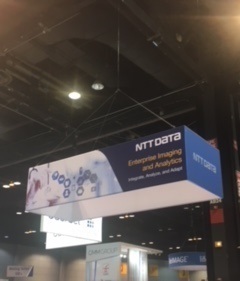
NTT Data Services' customers will be
able to evaluate imaging data using
algorithms and automation tools
developed by MD.ai
By John Fischer and Lisa Chamoff
CHICAGO — NTT Data Services is getting into the artificial intelligence (AI) game, partnering with imaging research and artificial intelligence company MD.ai to develop algorithms and automation, and help the reams of data that hospitals collect and store work for them and provide revenue.
The partnership was announced at the 2017 Radiological Society of North America (RSNA) annual conference and will allow NTT Data Services clients to share revenue for studies that are used for data validation, and receiving credits for the company’s other products and solutions through the advocate AI program, a rebranding of the company’s imaging research platform that is being rolled out in the first quarter of next year.
Customers will also have early access to deep learning algorithms for images that are developed through the partnership.
“NTT Data Services has a vision to accelerate the adoption of artificial intelligence into the enterprise imaging strategy,” Mitchell Goldburgh, global solutions manager for enterprise imaging and analytics at NTT Data, told HCB News. “MD.ai has a front-end and back-end solution that supports that strategy. Their back-end solution allows us to examine existing studies and help quantify the value to an AI developer as to what type of pathology of diseases are available. We then can help generate opportunities for AI developers to have access to that data, properly labeled and identified so they can train their algorithms.”
The partnership provides MD.ai with an opportunity to test the efficiency of its tools and to integrate with multiple algorithm vendors to accelerate the adoption of AI.
In exchange, NTT Data clients will be able to monetize their data to generate revenue through a data cooperative with NTT Data in a program called Advocate AI, should they choose to participate. They also can run a subset of algorithms, when available, in real time at the desktop, using a delivery mechanism for the detection of previously missed diseases, enabling cost avoidance and allowing for greater evaluation of incidental findings that may indicate the presence of chronic disease.
“The impact on patient care is the umbrella of what AI promises to deliver - early detection of chronic disease, improved outcomes,” said Goldburgh. “Today, many of the algorithms are focused on popular areas such as chest imaging vs. tuberculosis. I think if we can go beyond that, there are opportunities to find less prevalent diseases that, if caught, have a much larger impact.”
Back to HCB News
